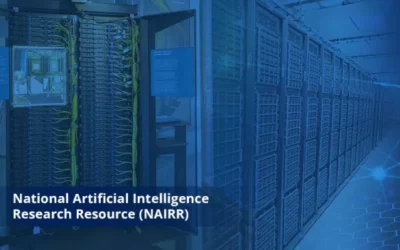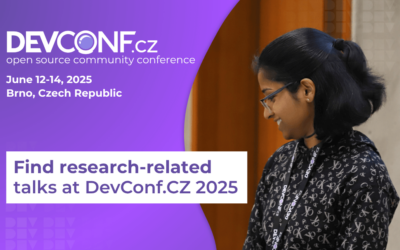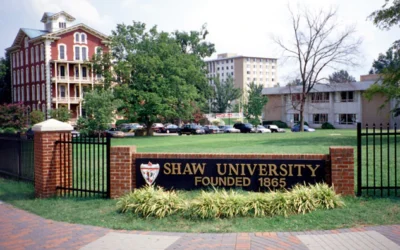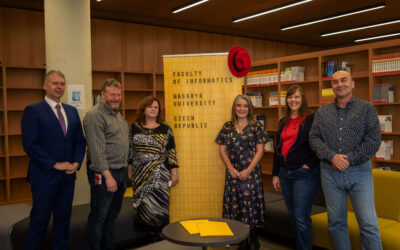Drug discovery is a complex process that takes an average of 10-15 years and demands substantial resources. Accelerating life sciences research progress with AI can save more lives and cut costs, and developing that technology will happen more quickly and safely in the open. That’s why Red Hat is part of the AI Alliance Drug Discovery Working Group, co-chaired by US Research Director of Red Hat Research Heidi Dempsey. The group was formed to establish a world-class open research community to drive the development of open source AI foundation models designed to facilitate impactful scientific breakthroughs. Other co-chairs are Jianying Hu (IBM Research), Michal Rosen-Zvi (IBM Research), Feixiong Cheng (Cleveland Clinic), Diane Joseph-McCarthy (Boston University), and Yannis Paschalidis (Boston University).
AI for Biomedical Research and Drug Discovery Symposium
The working group held a virtual symposium Monday, September 29, 2025, to bring together an interdisciplinary group of experts from clinical practice, academia, the pharmaceutical industry, technology companies, open source communities, and policy institutions. The event is a follow-up to the October 2024 AI for Drug Discovery Open Innovation Forum held at Boston University and co-sponsored by Red Hat, IBM, the MOC Alliance, and others. The 2025 virtual workshop was designed to reach out to current and potential European participants in the AI Alliance research community.
The event gathered nearly 100 live virtual attendees for keynotes from global leaders in the field of AI and lifescience; demos and walkthroughs of open source tools, models, and AI agents; and a panel on collaborative benchmarking for biomedical foundation models. All keynotes and the benchmarking panel are available to watch on the AI Alliance YouTube channel. See the full slate of speakers below.
In closing remarks, Paschalidis, Boston University Distinguished Professor of Engineering, noted that collaboration among multiple disciplines is critical for progress. “People that have a lot of expertise in the algorithmic world don’t necessarily understand the domain in which they are trying to make contributions,” Paschalidis said. “Having domain knowledge is quite important.”
Join the community
The working group is actively seeking developers, researchers, technology innovators, and industry experts to join them in developing safe, scientifically reliable, and accessible AI-powered tools for drug discovery. The working group’s core objectives are to:
- Foster interdisciplinary collaboration: Enabling biologists, chemists, and data scientists to contribute to AI model development
- Promote reproducibility in AI research: Ensuring model accuracy, accessibility, and transparency
- Develop an open source repository of models and data: Creating a valuable resource for researchers worldwide
Contributors who can build, test, evaluate, educate, and/or advocate for open AI models in drug discovery, biologics, and molecule applications are encouraged to reach out via the group’s AI Alliance webpage and join the community.
Symposium presentations and panels
- Ora Schueler-Furman (Hebrew University)—AI in Protein Modeling and Design: Insights from Peptide–Protein Applications
- Karsten Borgwardt (Max Planck)—Machine Learning for Biomarker Discovery: From Genetics to Intensive Care
- Feixiong Cheng (Cleveland Clinic)—Leveraging Genetics, Multi-Omics and Real-World Patient Data from Diverse Populations Fuels Drug Development in Alzheimer’s Disease using Scalable Generative AI Models
- Zhiyong Lu (NIH)—GeneAgent: Knowledge-Grounded AI Agent for Gene Set Analysis and Biomedical Discovery
- Muzlifah Haniffa (Sanger)—Big Data plus + Ai >> Biological Mechanisms at Scale
- Tom Linsky (Merck) —AI technology as a partner in drug discovery
- Walkthrough of Open Source Tools and Models for Biomedical Research—five talks including CellWalkR, MAMMAL, BMFM-DNA, MMELON, and BMFM-RNA models
- AI Agents at the Frontier of Biomedical Research—four talks on Biomed Agentic Workflows
- Panei with Aled Edwards (Structural Genomics Consortium), Tomer Cohen (HUJI), Pat Walters (OpenADMET) and chair Michal Rosen-Zvi (IBM Research)—Collaborative Benchmarking for Biomedical Foundation Models: Driving Discovery and Impact








